- Home
- Marie Rutkoski
The Shadow Society Page 2
The Shadow Society Read online
Page 2
And then it was his turn.
“My name is Conn McCrea.” He spoke in a low voice, as if those three syllables were the most unimportant on earth. Despite the spelling, which I saw at a much later date, his last name was pronounced “McCray.”
Taylor Allen, who was sitting right next to him, gave him a coy look. He didn’t seem to notice. He slouched at his desk, but there was something a little calculated in his slumped shoulders and stretched out legs. I got the impression that he had riffled through his closet, found his Typical Teenager costume, and was trying it on.
And now we come down to it. My suspicion: Conn McCrea wasn’t exactly normal.
My reasons? Let’s just say it takes one to know one.
Ms. Goldberg leaned against the blackboard, ignoring the chalk that dusted her clothes, and said, “Our first text will be ‘The Love Song of J. Alfred Prufrock,’ by T. S. Eliot.”
“Great. A love poem,” muttered Jason Sloane. He added in a falsetto, “Smooooochies!”
The class tittered.
“Do you have a problem with that, Mr. Sloane?”
“Nope. I like smooches.”
“Then you may be disappointed to know that there are none in this poem. You might wonder, in fact, if there is any love at all. The main character, J. Alfred, can’t decide if he should tell a woman how he feels about her, but he’s just as concerned about whether he belongs to a world of dirty one-night hotels or to the chic society of tea parties.” Ms. Goldberg opened a slim book and began to read:
“Let us go then, you and I,
When the evening is spread out against the sky…”
I wish I could say I was instantly wowed by “The Love Song.” But the truth is that I was inventing a poem of my own:
I will not think of Conn McCrea.
I will not, cannot, in any way.
Gradually, though, “The Love Song” crept under my skin. I listened as J. Alfred Prufrock wandered down deserted streets. I didn’t forget about Conn, but I forgot to forget about him, and let myself study him as Ms. Goldberg’s voice rose and fell.
I was in the back. He couldn’t see me.
Why, then, would I have bet anything that he could feel me, could sense my stare on the nape of his neck like I had his in those minutes before the first bell?
“So, what do you think of him?” Ms. Goldberg closed the book. “What kind of man is J. Alfred?”
“He really likes tea,” someone offered.
“He likes Michelangelo? Or hates Michelangelo? I don’t know.”
“He repeats himself a lot.”
“Why doesn’t he quit moaning? J. needs to man up.”
“He cares about the way he dresses.”
“He’s a loser.”
When Ms. Goldberg came to Conn, he hesitated. Finally, he said, “He’s uncertain.”
I couldn’t help puzzling over Conn’s answer as if it were a clue to his character and he was a poem that needed to be interpreted. Uncertain? About what?
“Ms. Jones?”
Startled, I glanced at Ms. Goldberg. The awkward silence told me she had been calling my name for some time. I might have blurted out something random, but then I noticed that Conn had tilted his head slightly. Like a listening hawk.
I thought of J. Alfred walking on the beach with the bottoms of his trousers rolled, and how these lines of the poem weren’t the last, but might as well have been:
I have heard the mermaids singing, each to each.
I do not think that they will sing to me.
“He’s lonely,” I said. “And he’s given up.”
Conn didn’t turn around. He didn’t look at me.
Taylor, however, did.
Freak, she mouthed.
Who would have guessed it? As things turned out, Taylor was absolutely right.
5
The last bell rang. Jason slapped Conn on the shoulder, saying, “C’mon,” and the two of them strode out the door with Taylor leading the way.
I walked home. Where there weren’t trees or raised-ranch homes, I could see far and wide around me. The land here is as flat as the palm of my hand. Illinois is tornado country.
I always stayed outside in a tornado long after anyone sensible had gone down into a basement. I loved to watch the sky go green and brown and dangerous. The wind thrashed the trees, and sometimes, if I was lucky, I’d spot the cyclone twisting in the sky. Afterward, I’d walk around and survey the damage: willow branches lying in whips across the sidewalk, and gutters rushing with leaves and the stringy bodies of drowned worms.
The arrival of Conn McCrea at Lakebrook High made me think of a tornado—of the aftermath, and how the world looked as if it had been spun in a blender. Most of all, it reminded me of the very start of a storm. Of the alluring risk, the winds muscling against me as I waited to see if that cyclone would touch down, and where, and when.
* * *
WHEN I GOT HOME, I unlaced my boots and lined them up by the door.
Marsha’s place was your typical ranch home. The front door opened up into a living room that connected to the kitchen, with nothing to separate the two spaces except a brassy metal strip on the floor that marked the border between the carpet and the linoleum.
The house was cozy. And cutesy. An oil portrait of a raccoon hung over the television. There was a wall rack of forty-nine silver spoons with a different state bird painted onto each handle. Marsha had told me with great satisfaction that she had bought only one: the spoon with the Illinois cardinal. “The rest are gifts from friends,” she explained. “Once I get the willow ptarmigan from Alaska, my collection will be complete.”
Her pride and joy was the fish tank, which stood by the hallway leading to the two bedrooms. It had a bed of blue rocks, a treasure chest that burbled open every few minutes, and a crew of angelfish. Marsha called them each by name, though if she was too busy for individual hellos she might simply wave and say, “Good morning, my angels.”
I fed the angelfish, watching them dart after rust-colored food flakes. Then I launched myself onto the leatherette sofa and called Jims.
“Hey, sister.” He was chewing on something. “What’cha building?”
“A garden that grows ninja warriors.” I swung my legs over the armrest. “You?”
“A rocket ship fueled by chocolate sauce. No! A rocket ship that delivers chocolate sauce.”
For endless conversation about nothing at all, Jims was the best.
He began pestering me to see a band called the Flippin Idjits play in the city that weekend.
“Not sure.” I wagged my feet. “They sound a little too dance-y to me.”
“Nuh-unh. They sound like men with lean hips who know how to shake ’em.”
For pure distraction, Jims was the best.
He added, “Just like Conn McCrea.”
Or not.
“He’s in my American History class,” Jims said. “Right after lunch. The boy knows jack about the presidents. He said JFK died of a brain tumor!”
I pushed myself off the couch and strode into the kitchen. “I don’t care.”
“You don’t care because you prefer your men sweet and empty, like one of those hollow gumballs you can buy for twenty-five cents from a dispenser in the grocery store.”
“No.” I paced the linoleum floor and lied through my teeth. “I don’t care because I’m thinking about my art project, and want your advice.”
“Yeah?” I could almost hear him rubbing his palms. “Sure thing, young grasshopper. You want wisdom, you’ve come to the right place. Jims to the rescue. So, what’re you planning?”
“Um…” Since up to that moment I’d been planning a big, fat Nothing, I scrambled for a response. I reached past the butcher block of knives resting on the counter, opened a cabinet, and rummaged through Marsha’s baking supplies. I looked at a green bottle. “Maybe something with vegetable dye?”
“Ah, avant-garde. I like it, I like it.”
I reached for a tea ca
nister. “Or tea leaves?”
“I sense a food theme. I am an expert on that topic!”
I opened the canister. Inside was a thick roll of money.
“Jims. I’ve got to go.”
“But we’re just getting started—”
I hung up.
The label on the tin was for Lapsang souchong tea, which tastes like charred wood. Even the smell of it made me want to throw up. And Marsha knew it.
What she didn’t know was why. I was terrified of fire. I always had been, though I did my best to hide it. It was embarrassing, because it wasn’t only fire that set me on edge. It was everything that had anything to do with fire. Cigarettes. Smoke. Even stupid smoky-tasting tea.
I unwrapped the rubber band around the money. Most of it was small bills, but there was a lot of it. Hundreds of dollars. Maybe even a thousand.
What was Marsha saving for? And why was she hiding it from me?
I fanned it out and couldn’t help wondering if she’d miss a twenty. Then I quickly tapped the cash against the countertop like a deck of shuffled cards.
She was hiding it from me because it was none of my business. I was just her foster kid.
Who didn’t need to give her a reason to kick me out.
I put the money back into the tin, clamped the lid shut, and shoved it into the cabinet—not a moment too soon. Marsha’s car pulled into the driveway. She walked into the house, her hands rustling with plastic bags, and let the door bang shut behind her. “Hi, Darcy. Did you have a good day?”
Had I? Even I didn’t know the answer to that question. “It was okay.”
“Well, I am dog-tired.” Marsha plopped down on the couch and propped her feet on the coffee table. She was still wearing her name tag from the bargain clothing store where she worked as an assistant manager. “I think we both deserve a treat.” She dug through one of the bags and pulled out a pack of multicolored chocolate-covered marshmallows. She ripped it open and offered it.
“No, thanks,” I said.
“Go on, have a pink one. I love the pink ones.”
“It’s just dye. They all taste the same.”
“I know. But the pink cheers me up.” She wriggled her fingers above the marshmallows and picked out her favorite. “Are you working at the Jumping Bean tonight?”
“Yes.” I sighed.
“Keep interested in your career,” she said. “However humble.”
Marsha enjoyed quoting from a plaque that hung above the toilet in her bathroom. It was inscribed with a letter called “Desiderata,” which means “Desired Things.” It’s full of impossible advice, such as the idea that you could get along with everybody without giving up pieces of yourself, and that even a minimum wage job should be thought of as a worthy “career.”
“Here.” She handed me a plastic bag. “This is for you.”
Inside was something soft: a ruby cardigan. “Marsha, you didn’t have to—”
“I sure did. You look like you’re going to a funeral. I want to see you wearing something other than black, black, and black. Go ahead, put it on. It’s part cashmere.”
Even though the sun was going down, it was still shaping up to be a steamy evening. “But—”
“No buts. It was on sale, plus I got my employee’s discount. And that itty-bitty thing isn’t going to fit me.”
I touched the red sweater. It had been a long time since I’d received a gift. “Thank you.”
“You’ll look pretty in it,” she said.
Would I? Could a red sweater change so much?
It was as if she’d read my mind. “You’re the artist, Darcy. Don’t you think a little color packs some punch?”
I smiled, not only because it would please her, but also because I wanted to. Then I took a pink marshmallow, pulled on the cardigan, and left for work.
At the coffeehouse, I focused on cappuccinos, lattes, and double-shot espressos. My hands steamed milk and ground beans. I paused only for enough time to peel off the red cardigan. It was too hot. More than that—wearing the sweater felt too hopeful. Like I wanted to look pretty for someone, and that someone wasn’t Marsha.
Inside, I recited my poem and matched its beat to the rhythm of my work:
I will not think of Conn McCrea.
Easier said than done.
When I locked up the café, I looked out at the dark parking lot, reminding myself that Conn was already liked. Already adored. And I was a misfit.
That’s right, a voice whispered inside. You don’t fit in. You don’t belong in this world.
I frowned. That was a weird thought. I didn’t belong in this world?
It wasn’t like there was any other one.
6
It took me a couple of weeks to wear the sweater to school. I kept blaming the heat for this, but then one day, in that schizo way Chicagoland weather has, it was suddenly autumn. The air was apple-crisp, and I had run out of excuses.
Lily’s jaw dropped when she saw me wearing the cardigan. She whirled us into the girls’ bathroom, demanded I put on her lipstick, and swept the loose hair off my face. She produced a handful of bobby pins as if by magic.
“Lily, what are you doing?”
“Finishing what you started.” Her eyes met mine in the mirror. “This is the first time you look as if you’re not trying to disappear.” She swiftly did something complicated with my hair. “There. Now everyone can see what a lovely, slender throat you have.”
I tightened my mouth. “They can see this.” I pointed to the scar at the base of my neck, where the skin sloped toward my shoulder. It was an old, white slash.
Lily lost her imperious air. “You still don’t remember how you got that?”
I looked at her.
“Sorry,” she said. “I shouldn’t have asked.”
I shrugged. It wasn’t her fault I was a messed-up amnesiac.
“Well, what’re you going to do, hide it forever?” She gave me a gentle push out the bathroom door. “Go.”
Luckily, the boys made little comment on my new and supposedly improved appearance. Jims just said “Ooh la la” when he passed me in the hall, and Raphael gave me an incredulous stare in Pre-Calc. I tried not to take offense, since Raphael was fizzing with anxiety and barely able to pass for a normally functioning human being. Auditions for the fall play were that afternoon.
In English class, I did something different. That moment of walking through the door was always agonizing, always the best and worst part of my day. So over the past week, I had developed a ritual. It was a simple one: eyes down, feet steady. Walk.
And don’t look at him.
But that day, I did.
The effect was instantaneous. Conn’s eyes were on me. His mask of boredom slipped away, and it was only then that I knew that it was a mask, that it had to be, it had to be fake, because what I saw underneath was too real. His face was fierce, filled with something hot and strange.
And resentful.
I slunk to my seat. I had to get to English earlier, I thought shakily. He always beat me there. He always sat in the middle, so that if I sat anywhere else than in the back I’d feel like a target in his line of sight. Even sitting in the back wasn’t the perfect solution, because I had to push myself past him. Every day.
I ignored most of the lesson, at least until Ms. Goldberg said, “‘I am no Prince Hamlet.’” She was reading from her book. “What does J. Alfred mean? Why does he say he’s ‘an attendant lord, one that will do / To swell a progress, start a scene or two’?”
I had a pretty good guess, but I sure wasn’t going to raise my hand. I already felt enough like a fool.
“Well?” Ms. Goldberg waited, and the entire class hardened into stubborn silence.
Deep down, she must have been a very perverse person, because she grinned. “Isn’t that appropriate,” she drawled, “since J. Alfred spends the entire poem debating whether to profess his love, and chooses silence. Here is one question you will answer, or fail my class.” She turn
ed to the board and wrote:
Do I dare
Disturb the universe?
“This is J. Alfred’s question,” she said, “and it is yours. Your assignment is to decide what it means. I will give you a month to prepare a presentation of your findings to the class. You may work alone or with a partner.”
Well, that was fair. At least she wasn’t going to force me to find someone to pair up with. I listened to the squeal of desks dragged across the floor. To loud voices bouncing off white concrete walls as people sought and found partners. I opened my sketch pad and kept my head down, doodling a cityscape, though it was no city I had ever seen. The skyscrapers were slender and curved. They looked like a wind could knock them down.
“Darcy?”
That voice. Quiet. Deep. I knew before I lifted my eyes who owned it, but I couldn’t believe he was speaking to me.
“Will you be my partner?” asked Conn McCrea.
There was only one possible answer. “Yes.” I shut my sketchbook, but not before his gaze fell on my drawing. I could have sworn I saw a flash of recognition in his eyes. Then it was gone, and I doubted what I had seen, for how could he know a city I had invented only moments before?
Conn pulled up an abandoned chair and sat down next to me. He was tall, yes, but broader than I’d thought, not as lean as he’d seemed from afar. He looked like he trained for something.
It troubled me more than it should have. I instinctively touched the scar on my neck. His gaze flickered to it, and lingered.
Then his eyes met mine. They were a fitful color, the kind that changes according to mood or the light. Gray, blue, green. Like pieces of glass washed up on the shores of Lake Michigan, polished by waves almost as big as the sea’s. My pulse sped along the scar beneath my fingertips.
“Did you know the answer to Ms. Goldberg’s question?” he asked. “About Prince Hamlet?”
I went for nonchalance. “I suppose there could be several theories. What’s yours?”
He gave me an inviting smile. “I’d like to hear what you have to say.”
I played with my pencil. “J. Alfred’s decided to be unimportant. No one’s going to notice him.”

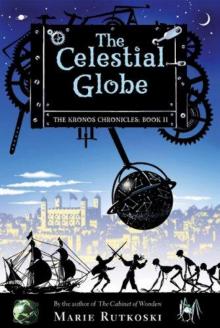 The Celestial Globe
The Celestial Globe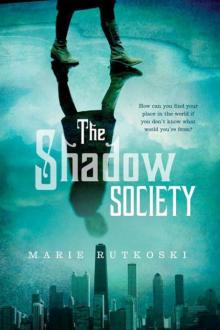 The Shadow Society
The Shadow Society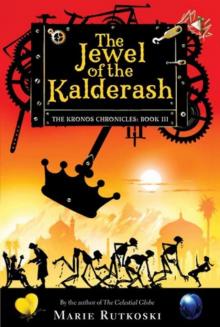 The Jewel of the Kalderash
The Jewel of the Kalderash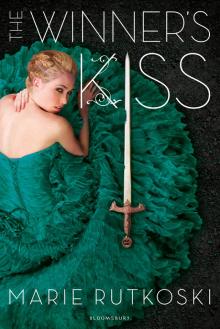 The Winner's Kiss
The Winner's Kiss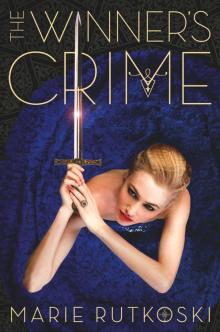 The Winner's Crime
The Winner's Crime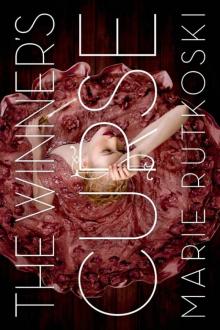 The Winner's Curse
The Winner's Curse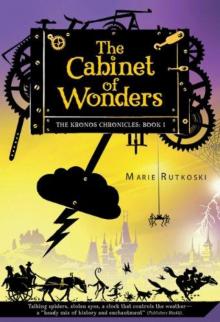 The Cabinet of Wonders
The Cabinet of Wonders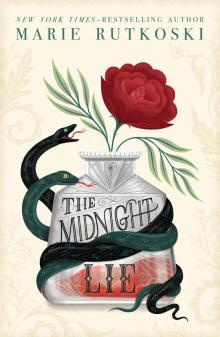 The Midnight Lie
The Midnight Lie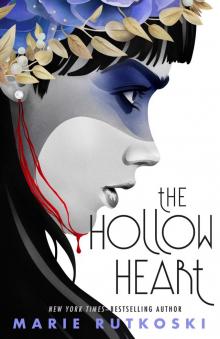 The Hollow Heart
The Hollow Heart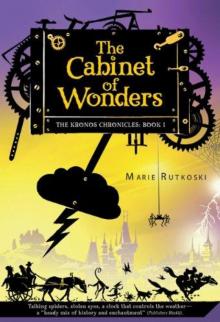 The Cabinet of Wonders: The Kronos Chronicles: Book I
The Cabinet of Wonders: The Kronos Chronicles: Book I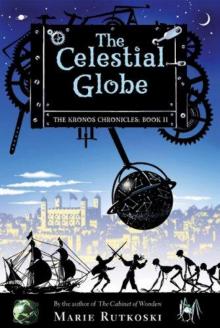 The Celestial Globe: The Kronos Chronicles: Book II
The Celestial Globe: The Kronos Chronicles: Book II